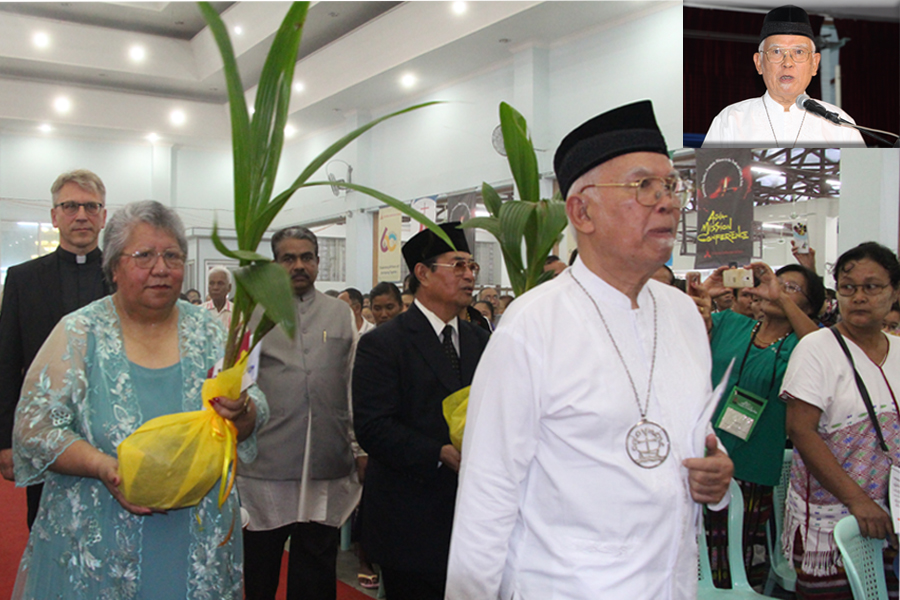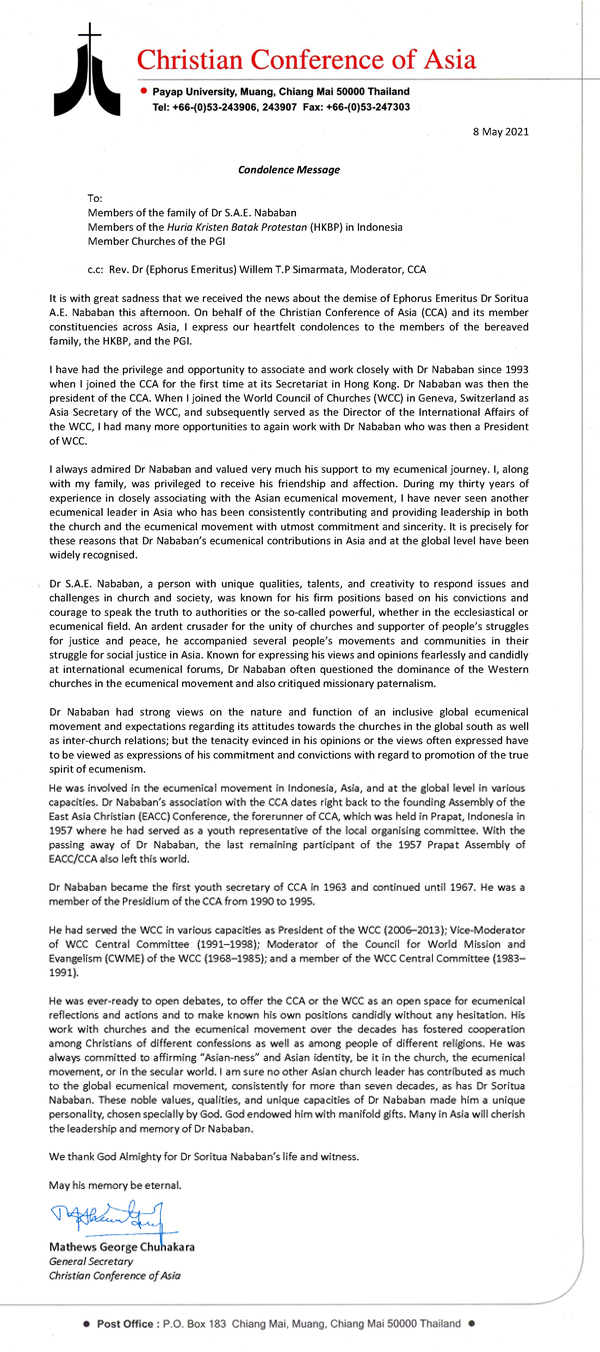CCA mourns the passing away of Dr S.A.E Nababan, prominent Asian ecumenical leader
 Dr S.A. E Nababan at the Diamond Jubilee celebration of CCA held in Yangoon, Myanmar (2017).
Dr S.A. E Nababan at the Diamond Jubilee celebration of CCA held in Yangoon, Myanmar (2017).
CHIANG MAI: Dr Soritua Albert Ernest Nababan, a former Ephorus (Archbishop) of the Huria Kristen Batak Protestan (HKBP) in Indonesia and a prominent Asian ecumenical leader who has long been a major figure in the global ecumenical movement, has passed away.
He had been unwell and was undergoing treatment since the beginning of this year; he passed away in the afternoon on Saturday, 8 May, 2021, at the Medistra hospital in Jakarta, Indonesia. He was 88 years old.
Dr Soritua Nababan had served as the supreme head (Ephorus) of HKBP, the largest Protestant church in Indonesia, from 1983 to 1998.
He was involved in the ecumenical movement in Indonesia, Asia, and at the global level in various capacities.
Expressing deep condolences on the demise of Dr Soritua Nababan, the General Secretary of the Christian Conference of Asia (CCA) Dr Mathews George Chunakara said that he was an eminent Asian ecumenist, and a mentor and friend to many in Asia and beyond.
Recollecting the past seven decades of Dr Nababan’s contributions to the Church and ecumenical movement, the CCA General Secretary further said, “Dr Nababan was an ardent crusader for the unity of churches and a supporter of people’s struggles for justice and peace. He accompanied several people’s movements and communities in their struggle for social justice in Asia. Many in Asia will cherish the leadership and memory of Dr Nababan.”
Known for expressing his views and opinions fearlessly and candidly at international ecumenical forums, Dr Nababan often questioned the dominance of the Western churches in the ecumenical movement and also critiqued missionary paternalism.
“Nababan had strong views on the nature and function of an inclusive global ecumenical movement and expectations regarding its attitudes towards the churches in the global south as well as inter-church relations; but the tenacity evinced in his opinions or the views often expressed have to be viewed as expressions of his commitment and convictions with regard to promotion of the true spirit of ecumenism,” added Dr Mathews George Chunakara, who has had opportunities to work with Dr Nababan and to observe him for three decades through his own work with the CCA and the World Council of Churches (WCC).
The CCA General Secretary further added that Dr Soritua Nababan’s work with churches and the ecumenical movement over the decades has fostered cooperation among Christians of different confessions as well as among people of different religions. He was always committed to affirming “Asian-ness” and Asian identity, be it in the church, the ecumenical movement, or in the secular world.
“I am sure no other Asian church leader has contributed as much to the global ecumenical movement, consistently for more than seven decades, as has Dr Soritua Nababan,” stated Dr Mathews George Chunakara.
Dr Nababan’s association with the CCA dates right back to the founding Assembly of the East Asia Christian (EACC) Conference, the forerunner of CCA, which was held in Prapat, Indonesia in 1957 where he had served as a youth representative of the local organising committee. He became the first youth secretary of CCA in 1963 and continued until 1967. He was a member of the Presidium of the CCA from 1990 to 1995.
He had served the WCC in various capacities as President of WCC (2006–2013); Vice-Moderator of the WCC Central Committee (1991–1998); Moderator of the Council for World Mission and Evangelism (CWME) of the WCC (1968–1985); and a member of the WCC Central Committee (1983–1991).
He served as the Vice-President of the Lutheran World Federation from 1984 to 1991, and earlier, from 1970 to 1977, he was also the Moderator of the Lutheran World Service.
His ecumenical contributions and leadership in his own native land included his services as the General Secretary of the Council of Churches in Indonesia—the Communion of Churches in Indonesia (PGI) from 1967 to 1984, and also a stint as its Chairperson from 1984 to 1987.
Dr Soritua Nababan is survived by his wife, Alida Lumbantobing, and his children Hotasi, Sindar, and Rosida.
His funeral will take place on Tuesday, 11 May 2021, in his hometown Siborongborong, North Sumatra, in Indonesia.











